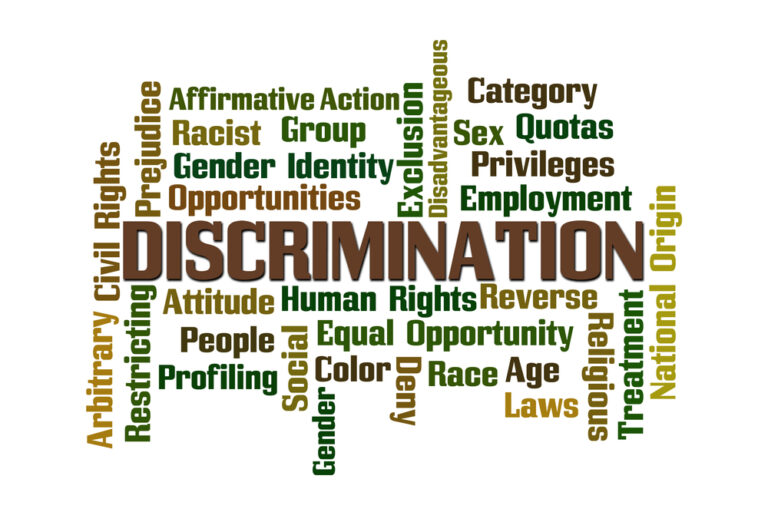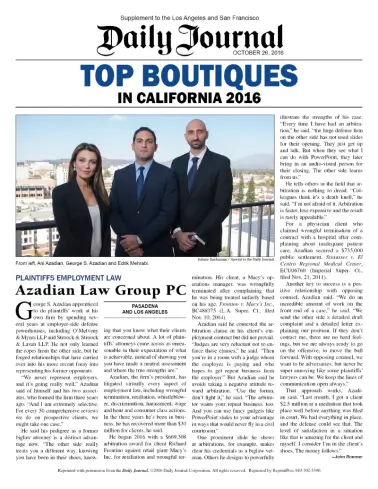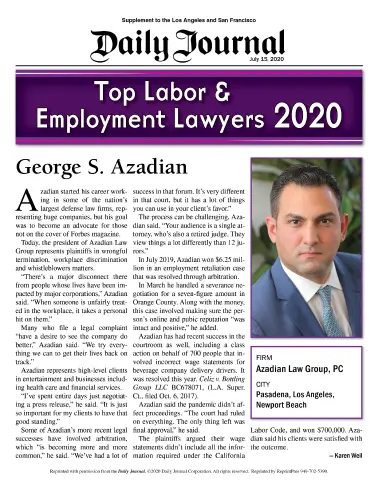10 Signs You’re Being Discriminated Against at Work in California
Discrimination in the workplace is an unfortunate reality that many people working in California experience every day. However, discrimination is not always overt. Many employees endure protracted abuse from their coworkers and supervisors due to a lack of awareness of their rights and the employment laws of the United States. Some employees may not realize that the treatment they have recently experienced at work constitutes discrimination. The following are 10 signs that you’re being discriminated against at work in California:

- Inappropriate jokes and commentary. Many employees hear offensive remarks and jokes in their workplaces. While some brush these aside, others may eventually realize that although those jokes are not directly made at their expense, they make them feel uncomfortable due to their personal qualities.
- Lack of diversity in the workplace. Employers may engage in discrimination while using various excuses to hide their discriminatory hiring practices. If you notice that everyone in your workplace fits a specific profile and your company is relatively homogenous, this could indicate discriminatory hiring practices.
- “Role ruts”. If it seems as though advancement is contingent on specific personal qualities, or if certain types of employees are relegated to specific roles, this could indicate discriminatory advancement policies.
- Denied advancement. If you were recently passed over for a promotion and the position was given to someone less qualified than you, this could be due to your employer’s preference for their personal qualities over yours.
- Questionable interview experiences. Your employer’s interview policies may indicate discrimination if your employer seems to alter the interview process based on a candidate’s personal qualities instead of basing hiring decisions purely on qualification.
- Unfair performance reviews. This is textbook discrimination when employers treat employees differently in performance reviews based on their personal qualities. Some employers who decide to make discriminatory firing decisions will levy poor performance reviews against certain employees to hide the true intentions behind their firing decisions.
- Hostile communication. If it seems as if your employer communicates with you more harshly than they do to other coworkers for the same topics, this could indicate discrimination. Employers can express frustration with inferior performance or failure to adhere to company policy, but they must treat all employees equally.
- Selective discipline. If certain employees are subjected to harsher penalties than others for workplace infractions, this strongly indicates an employer’s discriminatory attitude. Your company handbook may outline a disciplinary policy, and if an employer seems to deviate from this policy on a selective basis, this may constitute discrimination.
- Rules against discussing salary and benefits. Employees have the right to discuss their pay and benefits at their discretion. However, employers previously hid preferential treatment of employees and discriminatory pay policies by preventing employees from discussing these topics.
- Denial of reasonable accommodations. The Americans with Disabilities Act (ADA) requires employers to make reasonable accommodations for employees with medical conditions or disabilities. While employers are not required to make accommodations that pose an undue hardship, they must provide reasonable explanations when they refuse to grant requests for accommodations.
If you have experienced any of these situations in your workplace, it’s vital to discuss your concerns with an experienced employment attorney. Discrimination in the workplace can easily create a hostile work environment, preventing employees subjected to discriminatory practices from successfully completing their job duties. Therefore, it’s vital to take swift legal action if you believe you have been subjected to any discrimination at work.
What to Do About Discrimination
In most situations, it’s best to explore your company’s internal conflict resolution channels before proceeding with formal legal action for discrimination. California employers are legally required to enforce anti-discrimination policies, and most employers offer internal conflict resolution policies. However, if you are barred from using these options or if your employer retaliates against you for raising concerns about workplace discrimination, it’s best to contact an attorney about your concerns as soon as possible.
The Equal Employment Opportunity Commission (EEOC) is responsible for upholding anti-discrimination laws in the US and investigating workplace discrimination claims. Therefore, if you intend to take legal action in response to discrimination in your workplace, you must file an EEOC claim before filing your lawsuit. The EEOC will review your claim and determine whether you have grounds for a lawsuit, and they will issue you a Notice of Right to Sue if you do.
FAQs
Q: What Does Discrimination Look Like in the Workplace?
A: Workplace discrimination can take many forms. Ultimately, if you believe your employer treats you differently than your coworkers due to your age, race, sex, religion, medical status, or any other protected personal quality, this likely constitutes discrimination. However, this type of behavior is not always overt, and employers may attempt to use many different excuses to cover discriminatory practices.
Q: What Are the 10 Protected Classes in California?
A: California’s laws against workplace discrimination prevent mistreatment based on race, sex, age, marital status, sexual orientation, gender expression, military service, disability, medical status, or religion. Some of these protected classes overlap and pertain to multiple situations. Therefore, some employees are subjected to discrimination due to multiple protected qualities.
Q: How Do You Know If Your Employer Is Discriminating Against You?
A: The aforementioned 10 signs of discrimination are good guidelines that can help you determine whether recent experiences in your workplace constitute discrimination. Additionally, you can talk to coworkers and even former employees about their experiences to see if you can identify any discriminatory trends from your employer.
Workplace discrimination is an unfortunate reality for many California employees across all industries. Unfortunately, an employee who experiences this type of treatment is likely to feel isolated when resolving their situation. If you are unsure how to stop discrimination in your workplace, or if you have lost your job due to discrimination from your employer, the Azadian Law Group, PC, can help. Contact us today to schedule a consultation with our team and get the answers to your most important legal questions.
Related Blog Posts
In the last 48 hours, Los Angeles has found itself at the center of a storm—again. Following a series of...
Read MoreIn a case drawing national attention, the Phoenix Suns have found themselves at the center of a legal storm. Former...
Read MoreAccess to restroom breaks is a fundamental workplace right, but what happens when an employer allegedly punishes an employee for...
Read MoreTypes of Cases Handle By Employment Lawyers in Los Angeles, CA
The following presents an overview of the broad range of employment law cases that our employment attorneys are experienced at overseeing and favorably resolving.
Wrongful Termination
Wrongful Termination Lawyers in Los Angeles, CA Attorneys at Azadian Law Group who have filed wrongful termination lawsuits acknowledge that unfair termination can significantly impact an employee’s life. It can…
Age Discrimination
Age Discrimination Lawyers in Los Angeles, CA Azadian Law Group, PC regularly represents clients throughout Los Angeles, CA, who are the victims of age discrimination in the workplace. At Azadian…
Pregnancy Discrimination
Pregnancy Discrimination Lawyer in Los Angeles, CA At Azadian Law Group, PC, our pregnancy discrimination lawyer in Los Angeles, regularly represents clients who are the victims of pregnancy discrimination in…
Sexual Harassment
Sexual Harassment Attorney in Los Angeles, CA The Los Angeles Sexual Harassment Lawyers at Azadian Law Group, PC, know that in today’s modern era, some people often make the mistake of…
Racial Discrimination
Racial Discrimination Lawyers in Los Angeles, CA Azadian Law Group, PC regularly represents clients throughout Los Angeles who are the victims of racial discrimination at work. The Los Angeles Race…
Disability Discrimination
Disability Discrimination Attorneys in Los Angeles, CA There is a misconception that disabled people do not want to work or that disabled individuals simply cannot or will not be as…
Praise from Our Clients
Who We Represent
At Azadian Law Group, we are dedicated to upholding the rights and interests of employees in the workplace. Our expertise in employment law positions us as staunch advocates for those facing unjust treatment in their professional environments.
Whether combating workplace discrimination, addressing unfair termination, or negotiating equitable compensation, our team is committed to ensuring that every employee we represent is treated fairly and respectfully under the law.

Step 1
Explore our comprehensive range of legal services to find the specialized support you need.
Step 2
Arrange a free initial meeting with our experts to discuss your legal situation.
Step 3
Receive a custom strategy specially created for your case by our legal experts.
Call Us Now 213-229-9031
Tell Us Your Story
Speak out for justice. Your story can be the start of a new chapter of workplace fairness.




